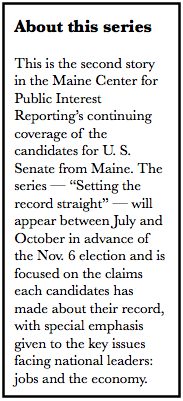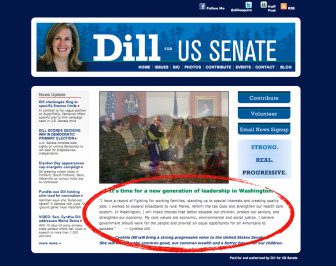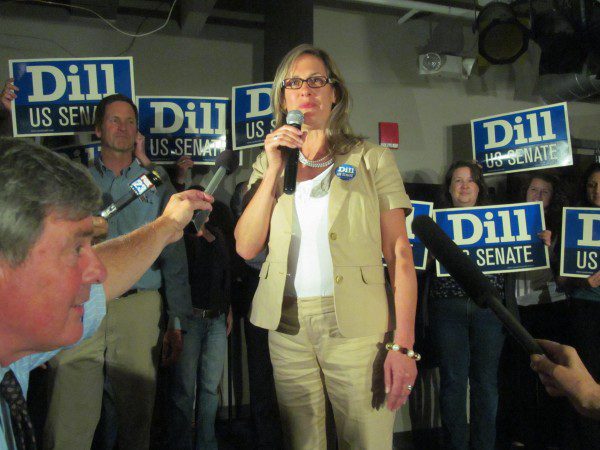Cynthia Dill, Maine’s Democratic candidate for Olympia Snowe’s soon-to-be vacant U.S. Senate seat, said on her campaign website last month that she “has a record of … creating quality jobs” during her six years in the state legislature.
But an analysis of Dill’s legislative history by the Maine Center for Public Interest Reporting found that claim to be largely premature. To date, only five permanent jobs can be attributed to Dill’s legislation, plus another 323 temporary positions — the bulk of which are construction jobs.
 During an interview last week, Dill defended her record when questioned about the validity of her job creation claim. “It’s a job,” said the Cape Elizabeth state senator. “Whether they are temporary or not, it’s something that I’m very proud of.”
During an interview last week, Dill defended her record when questioned about the validity of her job creation claim. “It’s a job,” said the Cape Elizabeth state senator. “Whether they are temporary or not, it’s something that I’m very proud of.”
On the morning of July 17 — the day after the interview — Dill asked her web developer to modify the homepage, an email she provided to the Center shows. The statement about job creation was removed on July 23.
The homepage now reads: “A middle class working mother fighting for jobs for American families, and a government that works for small business.”
When asked about the change on Wednesday, Dill said it had nothing to do with the publication of this story and that she had been working with a media consultant who recommended the change.
She stood by her claim that she has created quality jobs.

“Did I alone personally create jobs? No. But did the work that I did in the legislature lead to jobs? Yes, I believe it has,” Dill said. “It has absolutely nothing to do with the questions you asked.”
The home page of Cynthia Dill’s campaign as it appears when the story was published.
Dill is running against Republican Charlie Summers, the secretary of state, and Angus King, an independent and former governor.
Of the 42 bills Dill sponsored as a state legislator, two were directly tied to job creation. Of those, only one was signed into law and resulted in temporary construction work. The other — an effort to attract a data storage facility to Maine — died when it became clear that, absent state subsidies, the idea was impractical given the state’s high cost of energy.

Building broadband
The first of the two bills — “An Act to Enable the Installation of Broadband Infrastructure” — paved the way for construction of high-speed Internet lines to underserved areas of the state. Largely funded by a $25.4 million federal stimulus grant, the project came to be known as the Three Ring Binder, after the three interconnected rings that make up its design. Maine Fiber Company, Inc. is overseeing the project.
Dill’s 2010 legislation allowed the company to hang nearly 1,100 miles of fiber optic cable on existing utility poles by subcontracting the work to the pole owners, such as power companies. When completed later this year, Internet providers can lease the fiber at a flat rate. (Maine Fiber currently has agreements to lease fiber to a dozen Internet providers, a company spokesman said, and is in discussion with 29 others.)
The concept is to provide high-speed Internet access to users in rural parts of the state, many of whom rely on slower, dial-up connections. An April study commissioned by the ConnectME Authority, which advises the state on broadband expansion efforts, found that nearly 50,000 Maine households don’t have broadband access.
Yet with $19 million already doled out by the federal government, few permanent jobs from the project have materialized.
Aside from the handful of permanent jobs at Maine Fiber, there are an estimated 323 “full-time equivalent” jobs attributed to the project. These include six positions with Tilson Technology Management, the company hired by Maine Fiber to manage construction. As the Three Ring Binder nears completion, Tilson employees have begun to move onto other projects, president Josh Broder wrote in an emailed statement to the Center.
The bulk of the remaining 317 jobs are temporary construction work. The figure — reported on a quarterly basis by Maine Fiber to the federal agency that oversees the project — is not an exact number, but the product of a formula used by the federal government that takes the number of hours worked in a quarter and divides that by 520–the number of hours one person would accrue at 40 hours a week over 13 weeks.
Experts say permanent job creation from the project is unlikely to happen for years, long after the November election that decides if Dill becomes a U.S. Senator.
Regardless of the duration of the jobs, Dill said the number was “an excellent start,” and that the ripple effect would be felt in communities where the construction is taking place.
Dill defended her job creation record repeatedly in a July 16 interview, before backing off her claim online.
“I would say before you make a judgment of the quality of the jobs, ask the people who have them: ‘Are they in a better place because of it?’” said Dill, who was quick to point out the majority of jobs created by other stimulus-funded projects are also temporary. “Obviously, the Three Ring Binder has to be built before it’s going to create additional jobs.”
Those who have studied the project say it’s too early to quantify its economic effect. To date, it’s been more about job preservation than job creation, said Charles Colgan, a professor of public policy and management at the University of Southern Maine.
Colgan does not expect “a significant expansion” in the number of jobs created by the project long-term, and said the more pronounced effect is longer hours for employees of the roughly two dozen utility pole owners paid by Maine Fiber to do make-ready work on the poles.
“It’s limited in the kinds of growth we’re talking about,” Colgan said. “One shouldn’t judge the economic consequences over the last few years; the story of this will play out over the next few decades.”
No economic development studies of the Three Ring Binder have been conducted by the ConnectME Authority, said executive director Phil Lindley. As with similar broadband expansion efforts funded by the authority, Lindley said he expected the majority of jobs to be temporary.
“It’s like building a highway,” he said. “You have a lot of jobs in the construction of it, but not a lot in the operation.”
Getting a data center
For Dill, implementation of the Three Ring Binder was a means to a second bill that she hoped would bring jobs to the state by attracting a data storage facility.
Dill championed the potential for both projects on March 31, 2010, as she spoke to her fellow members of the House. It was signed into law one week later by then-Governor John Baldacci.
“The Three Ring Binder Project is about jobs and has the potential to turn some of Maine’s 20th century infrastructures into the cyber infrastructure of the 21st century,” Dill said. “Data and computer centers are the heart of the modern economy … Maine has a significant advantage in this critical and lucrative field in that financially troubled paper mills can be transformed into green data mills.”
“Conversations are happening right now about transforming our paper mills into data mills.”
Dill called the improved high-speed Internet access an “engraved and embossed invitation” to tech giants like Microsoft and Google to set up shop in Maine and, in doing so, create quality jobs.
But while she appeared to be banking much of the success of the Three Ring Binder on the creation of a data center powered by renewable energy, emails among Dill and legislative committee staff and industry executives show the idea was unlikely to succeed from the start.
In late October 2010 Dill asked Jon Clark, deputy director of the non-partisan legislative Office of Policy and Legal Analysis, for help drafting a concept bill, titled “An Act to Bring a Green Data Center to Maine.” Clark worked with Dill on legislation in the past and had experience on the subject.
After a series of email exchanges over permitting requirements and the potential of using hydro power for the project, Clark wrote back on November 8, explaining the details of a conversation he had with Fletcher Kittredge, CEO and founder of the telecommunications company Biddeford Internet Corp., or GWI. (The company was the original recipient of a federal grant to design and implement the Three Ring Binder project, later transferred to Maine Fiber Company.)
In his email, Clark wrote that Kittredge emphasized the cost of power as the major obstacle.
“In the end, he (Kittredge) didn’t sound very hopeful that there was a legislative means realistically to attract green data mills,” Clark wrote.
Clark continued to research the project for Dill, and on November 10 sent an email to Matt Jacobson, former CEO of Maine & Company, a Portland-based nonprofit aimed at attracting business to the state. Clark explained the impetus of Dill’s proposed legislation and asked Jacobson if he had any ideas to clear the hurdle of New England’s energy costs.
Jacobson replied the same day, forwarding the details of two similar projects, including one owned by Yahoo! Inc. that had recently opened in upstate New York. The deal — which Yahoo promised would bring upwards of 175 jobs — included $200 million in tax breaks and $58 million in electricity discounts from the state, the Buffalo News reported.
Two days later, Clark wrote back to Jacobson, asking if he thought Maine could compete with New York for a comparable project, albeit on a smaller scale.
“Can we compete? Sure – for the right price,” wrote Jacobson, who ran for Governor in 2010 and is currently the executive vice president of the Lewiston-based Internet technology company Oxford Networks. Jacobson explained that if Maine offered a 10-year subsidy to compete with other states, it would be spending $5,760 per day, or about $2.1 million annually.
“If we are prepared to offer that level of cash incentive, for 15-20 jobs, we could compete,” Jacobson wrote.
At Dill’s instruction, Clark proposed a concept draft, “that simply describes what you’re trying to achieve: A program to encourage the development of a data center in this State powered by indigenous renewable energy sources that utilizes the Three Ring Binder infrastructure and creates jobs,” Clark wrote on January 4, 2011 — the day before Gov. Paul LePage was sworn into office.
Soon after, it became clear the bill was not going to make it out of committee, Clark said in a recent interview.
“It was a cost issue,” he said. “A cost issue, obviously, is going to deep-six it.”
After reviewing the emails, Dill disagreed and said the reason the legislation died was purely political.
“I don’t think it had anything to do with the cost of energy … the cost of energy in Maine, while high nationally, is the lowest in New England,” Dill said, adding that she felt a newly formed political divide in the legislature was responsible for the bill’s ultimate failure. “I think it was just political.”
Republicans took control of both the house and senate after the November 2010 election, the first time since 1973 Republicans held a joint majority in the legislature.
Dill was in the House at the time and resigned her seat to run for an unexpected vacancy in the state Senate.
“And there was the state senate race, too,” said Dill, who assumed her current seat in the senate when she beat out Republican candidate Louis Maietta in a special election last May. “There just wasn’t going to be anything associated with my work in the legislature that was going to give me a boost.”
In an attempt to salvage the bill, Dill submitted an amendment to create a strategy council to develop a plan to attract a data center. The bill died in the Committee on Energy, Utilities and Technology. The committee co-chairs sent a letter to the state Department of Economic and Community Development urging it to report back with any progress by January 2012.
As of June, no follow up efforts have been made by the department, spokesman Doug Ray said. Ray said attracting a green data center “is not a focus right now.”
Energy committee co-chair Sen. Mike Thibodeau, R-Winterport, said that while he agreed with the gist of the bill, it wasn’t necessary to attract a data center. Thibodeau said Dill’s assertion that partisanship played a role in the committee’s decision “is unfortunate.”
“She brought a concept draft with very little information,” he said. “If Cynthia wants to pass legislation, she needs to do a little more homework and come back with some details.”
Internet record
In the winter of 2008, Cynthia Dill attended a meeting at Dartmouth College at the recommendation of Lindley. It was during the meeting — geared toward small business owners — that Dill decided to focus her legislative efforts on increasing broadband Internet access to rural Maine.
The following summer she sponsored legislation that established the Broadband Strategy Council, tasked with advising both the authority and the University of Maine system on maximizing opportunities to apply for federal grants.
Soon after, Dill became involved in early stakeholder meetings for the Three Ring Binder project. But not everyone was on board from the start, and passing the legislation required a number of compromises, Dill said, most notably a committee amendment that created a broadband sustainability fee.
The fee, currently $3 per mile of leased fiber, is put into a pool managed by the ConnectME Authority; Internet providers can apply to have the money reimbursed, provided it goes toward projects that will further expand broadband access.
“It was a compromise,” said Lindley, who like Dill did not initially support the fee. “I didn’t see a need for it at the time, but it got everyone on the same page, so that’s good.”
The amendment was a turning point in the legislation, said public advocate Richard Davies, who represents ratepayers in state regulatory proceedings, and helped put existing utility pole owners like Fair Point Communications and the Telecommunications Association of Maine — both of which lobbied against the bill — at ease.
“If it wasn’t for them and their unions, there was hardly any opposition at all,” Davies said, adding that while it’s difficult to measure the success of the Three Ring Binder now, Dill’s legislation proved critical in making it a reality.
“I think we’ll look back at this and be glad it came along,” he said. “It facilitated so many things.”
Looking ahead
It’s been one year since the ribbon cutting ceremony for the Three Ring Binder in Aroostook County, but the Northern Maine Development Commission has yet to conduct an economic analysis of the project, confirmed director of investor and community relations Jon Gulliver.
“The primary reason is that we do not have the technical expertise in house to do such an analysis, but another fundamental reason is that any economic impact would be “potential” and not actual,” Gulliver wrote in an email to the Center.
With the project on the verge of completion, the Loring Development Authority is optimistic it can attract a data center to northern Maine and make Dill’s long-term goal a reality. The question, said president and CEO Carl Flora, is when.
“We had one company that we’ve had discussions with, but there’s nothing signed in stone,” he said, adding that once the Three Ring Binder is complete, he will apply a “full-court press” to entice technology companies to the state.
“We’re open for business. If someone shows up in a month and is ready to roll, we’ll go with it,” Flora said. “But if they say they need a year, or two or three, we’ll wait for that to happen. We’ll just have to see how it goes.”
Colgan said “there’s no question” there is potential for data centers, citing cool average temperatures and the state’s natural resources as a marketing advantage. A large portion of the energy required by data centers is used to cool its computer servers, Colgan said, which is why operating one in cold climates is more cost-efficient.
But, Colgan cautioned, a data center in Maine is unlikely to bring an abundance of jobs. A 2011 study commissioned by Northern Data Centers, LLC., a subsidiary of GWI, estimated a data center on the scale proposed by Jacobson would require 15-20 full-time employees.
“(Maine) has some of the characteristics data centers need, but not enough of them to be a major player,” Colgan said. “There is a role to play, but it’s going to have to be a relatively small one, because I don’t think we have the infrastructure to bring much in the way of job centers.”
The Maine Center for Public Interest Reporting’s Matt Drange and John Christie interviewed U.S. Senate candidate Cynthia Dill on Wednesday, July 11 at her home in Cape Elizabeth:
Disclosure: Maine Center board member Fletcher Kittredge is also CEO of GWI, which was awarded the stimulus grant that was later transferred to Maine Fiber Co.




